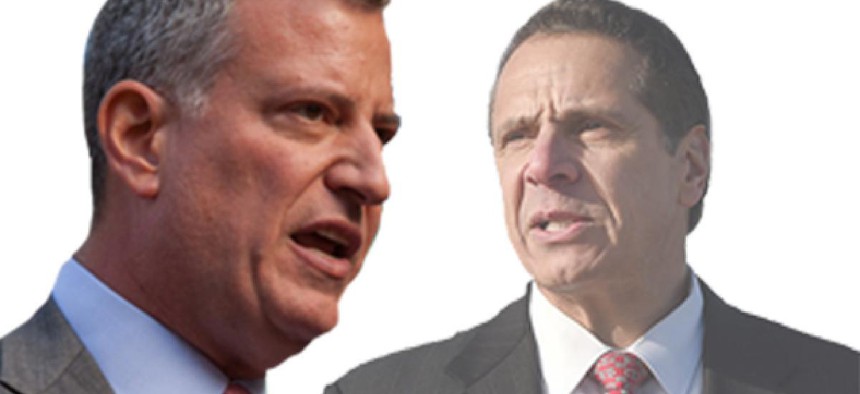New York nonprofits contend with competing priorities at city and state level

left
In the wake of the release of budget proposals from the city and state, nonprofits are looking to Albany to provide the funding necessary to ensure Mayor de Blasio’s initiatives don’t become a financial burden to their sector.
On Feb. 1, De Blasio unveiled an $88.67 billion budget for the fiscal year beginning July 1, 2018 that included a wide range of proposals which nonprofit leaders have greeted with a mix of praise and criticism. It includes increased funding for mental health services for female inmates, anti-bullying initiatives, funding for homelessness and even a web portal to match the young and old as roommates. This followed the release of Gov. Andrew Cuomo’s proposed state budget last month, which included a $4.4 billion deficit that must be balanced with demands to increase funding for the MTA and increasing costs to the state from Medicaid – as well as human services nonprofits demand for more funding
The city budget’s release kicked off a week of advocacy that brought nonprofit leaders to Albany including Mayor de Blasio who testified before a joint legislative budget hearing.
The word “nonprofit” did not appear during de Blasio’s testimony, according to a transcript, suggesting that the sector’s advocacy efforts will face an uphill battle among competing priorities such as funding for city subways and the beleaguered New York City Housing Authority.
City agencies and nonprofits depend on both state and local funds to carry out services. Cuts at either level can make service delivery difficult, if not impossible. For example, Cuomo’s proposed budget introduces a cap of $320 million on state funds devoted to child welfare, raising the possibility of a $129 million cut in state funds to the city’s Administration for Children’s Services. Half of that funding currently supports staffing and 45 percent funds programs such as family counseling and drug treatment, and the remainder currently funds child care contracts, ACS said in an email.
If government agencies budgets are cut then funding for the nonprofits who contract with them will be further reduced. Many nonprofits are already burdened by the fact that demand for government-funded services has been steadily growing while current government contracts rarely cover full program costs.
Children’s Village is one nonprofit that finds itself on the losing end in both the proposed state and local budgets. Cuomo proposes to eliminate state funding for Close to Home, a program he helped initiate that places formerly incarcerated youth near family rather than behind bars. This would slash 40 percent of the overall budget to the program just as the number of youth is predicted to double because of the implementation of Raise the Age legislation.
“It’s incredibly short sighted,” Kohomban said in a telephone interview. “Now to undo his legacy in this manner is stunning to me … Close to Home is his vision. It’s his baby.”
De Blasio’s announced proposals opened a new front in a battle that nonprofits were already waging in Albany. His proposed initiatives left nonprofits wondering whether they’ll have the support they need to help build the social safety net at a time of looming austerity from the state and federal levels.
“The mayor must assure that nonprofits are prepared to meet increased demand for social, health, education and other services by including in his budget the full costs of nonprofit programs, including indirect costs,” Sharon Stapel, executive director of the Nonprofit Coordinating Committee of New York, said in a statement.
However, proposed cuts to city programs seemed to portend just the opposite.
A $12 million proposed cut to adult literacy programs was “startling” to United Neighborhood Houses, given that it was announced at the same event where de Blasio praised the contributions to New York City made by the immigrants who benefit from such programs, Executive Director Susan Stamler said in a statement.
The city needs to step up in making sure that nonprofits can implement Progressive policies while receiving enough funding to maintain their financial solvency, according to Good Shepherd Services Executive Director Paulette LoMonaco.
“Community based organizations, like Good Shepherd Services, pivotal to achieving the city's goals, struggle to keep up with ever-rising operating costs and to make ends meet to provide quality services for the neediest children and families without (having) funding sufficient to that task,” she said in a statement.
* * *
Here’s a run-down of where the de Blasio administration proposes to increase spending, according to this part of the budget breakdown:
- Dept. of Education: Anti-bullying programs, school meals and support for LGBT students.
- Dept. of Correction: Expanded transportation to Rikers Island, funding to close one facility, and support services for women leaving prison. Creation of a Nunez Compliance Unit to monitor and implement reforms.
- Dept. of Sanitation: Funding for a mandated web portal connection between producers and recipients of food waste.
- Dept. of Homeless Services: Survey physical condition of shelters in order to eventually make them ADA compliant. Re-estimate of family and adult shelter costs, more staff “to enhance DHS business processes.”
- Dept. of Health and Mental Hygiene: Expanded coordination with NYPD for interventions with people with behavioral health crises. Funding for Unity Project.
- Health + Hospitals: Expanded forensic examiner staffing for speedier mental fitness examinations of criminal defendants. Expansion of domestic violence counseling and other mental services for women at Rikers. Transgender youth medical services.
- Dept. for the Aging: Expansion of a program that links older adults with people in need of housing.
- Mayoralty: Nonprofit Resiliency Committee staff.
NEXT STORY: NYN Media Buzz: Feb. 8, 2018